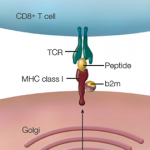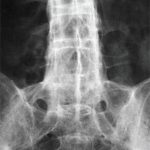A recent study of patients with psoriatic arthritis and cutaneous psoriasis found that these patients do not have a higher risk of worse outcomes after total hip arthroplasty compared with patients with osteoarthritis…


A recent study of patients with psoriatic arthritis and cutaneous psoriasis found that these patients do not have a higher risk of worse outcomes after total hip arthroplasty compared with patients with osteoarthritis…

Joerg Ermann, MD |
The mechanistic link between human leukocyte antigen B27 (HLA-B27) and ankylosing spondylitis (AS) is one of the great enigmas in rheumatology. The introduction of biological therapies that target tumor necrosis factor (TNF) or the interleukin (IL) 23/IL-17A axis has had a major impact on the quality of life for many patients with AS, and one…

Understanding how human leukocyte antigen (HLA) class I molecule B27 promotes spondyloarthritis has intrigued researchers for four decades. Although the association between the single gene variant HLA-B27—specifically some of its subtypes—with ankylosing spondylitis (AS) is particularly strong, how HLA-B27 directly influences disease development has not yet been clearly explained, although hypotheses continue to be generated….

Research has explored the connection between Sjögren’s syndrome and intestinal dysbiosis associated with ocular mucosal disease. A recent study found that oral antibiotics and desiccating stress lead to extreme changes in the gut microbiota in mice. In patients with Sjögren’s syndrome, researchers found that patients with the most severe keratoconjunctivitis sicca and combined systemic and ocular disease had the lowest diversity of stool microbiota…
Megan Brooks |
NEW YORK (Reuters Health)—Statin use is associated with a lower risk of developing inflammatory bowel disease (IBD), especially Crohn’s disease in older patients, new research suggests. “Prior studies have suggested that statins can decrease inflammation and may improve IBD in patients who already have the disease. To our knowledge, this is the first study to show…
Lisa Rapaport |
(Reuters Health)—People with psoriasis, a chronic inflammatory disease, are more likely to have heart attacks and strokes when they have a family history of cardiovascular problems, a Danish study suggests. Psoriasis wasn’t associated with higher risk of heart attacks or strokes when people with the skin condition didn’t have a family history of cardiovascular disease,…

A recent review investigated risk factors for preeclampsia in early pregnancy, finding that antiphospholipid antibody syndrome may be the strongest risk factor. As a result of these findings, researchers have compiled a list of risk factors to help clinicians determine which women are more likely to develop the condition and aid them in weighing treatment options…

Etanercept Submitted for Chronic, Severe Plaque Psoriasis in Children The U.S. Food and Drug Administration (FDA) has accepted the supplemental Biologics License Application for etanercept (Enbrel) for treating pediatric patients with chronic, severe plaque psoriasis.1 The application was submitted in early January 2016 and is based on results of a one-year Phase 3 study with…

CHICAGO—Celiac disease—the gluten-induced illness that can be seen alongside rheumatic diseases—has been seen much more commonly over the past 20 years than it was previously, but the illness can come with questions that are not always straightforward, an expert said at the ACR’s State-of-the-Art Clinical Symposium. The disease, in which the small intestine becomes inflamed…
Marilynn Larkin |
NEW YORK (Reuters Health)—Newly identified biomarkers could aid in the diagnosis of inflammatory bowel disease (IBD) and help guide therapy, Canada-based researchers report. Accurately differentiating between Crohn’s disease (CD) and ulcerative colitis (UC) is important for ensuring early and appropriate treatment. However, the conditions can’t be reliably distinguished based on clinical symptoms, site of disease,…